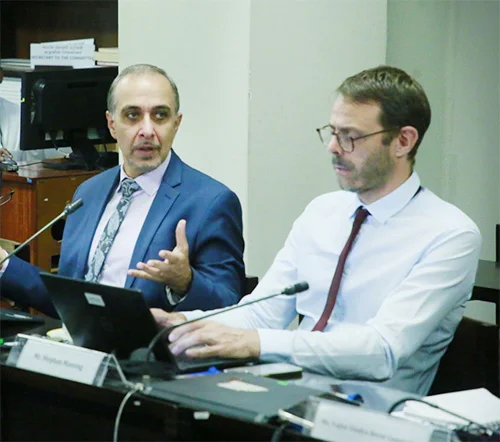The World Bank has warned parliament over Sri Lanka’s continuing failure to implement urgently required energy sector reforms. The WB has pointed out that for want of energy sector reforms, the country experienced significantly higher energy costs than other countries in the region.
The World Bank delegation has also underscored the need for pruning the public sector and improving overall productivity, pointing out that Sri Lanka maintains one of the largest public sector workforces with relatively low wage levels compared to peer countries.
The WB has made its position in respect of national economy at a recent joint meeting with the Committee on Public Enterprises (COPE), Committee on Public Accounts (COPA) and Committee on Ways and Means (COWM), parliament sources said.
The WB team led by Country Manager Gevorg Sargsyan had discussed the issues at hand with Dr. Harsha de Silva, Chair of the Committee on Public Finance (CoPF) and its members. Subsequently, the WB team had what parliament sources called a combined consultation session with COPE Chair Dr. Nishantha Samaraweera, COPA Chair Kabir Hashim and COWM Chair Wijesiri Basnayake along with members of the respective committees.

WB Country Manager Gevorg Sargsyan stressing a point
Committee Chairs expressed their appreciation to the World Bank for its continued support to Sri Lanka’s development over the years.
During the consultations, WB team has emphasized the responsibility on the part of the government address urgently needed energy sector reforms, develop ports and logistics sector and rightsizing the public sector.
Committee members briefed the World Bank officials on the mandates and oversight functions of their respective committees. Discussions also focused on key areas for reform and growth, including revenue collection improvement, job creation, poverty eradication, enhancing women’s participation in the economy, and strengthening sectors such as tourism, education, agriculture, and entrepreneurship.
The discussions also highlighted the importance of establishing efficiently run Public-Private Partnerships (PPPs) as an alternative to full privatization. World Bank officials shared successful international case studies where well-structured PPPs contributed to enhanced service delivery and sustainable economic development.
These consultations underscore the commitment of both the Parliament of Sri Lanka and the World Bank to foster stronger institutional collaboration and drive forward sustainable economic development.
Mr. Stephan Massing, Senior Operations Officer, World Bank Group, Victor Anthonypillai, Senior Country Officer, IFC, M. Jayalath Perera, Director Legislative Services and Director Communication (Acting) of Parliament were also present in these meetings.
